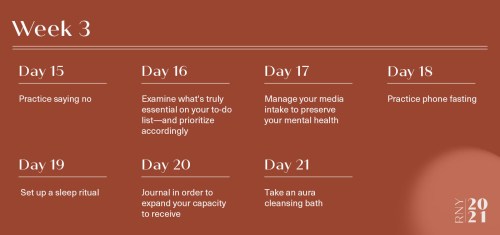Our editors independently select these products. Making a purchase through our links may earn Well+Good a commission
Use These Daily Practices To Build Inner Strength This Week
Self-care expert and Mama Glow founder Latham Thomas shares how to build inner strength with simple daily practices.

For your self-care practice to become an integral, non-negotiable part of your life, it has to be sustainable. The good news is that it can be—as long as you set some boundaries around your precious time and energy.
This week, you’ll take a look at how you spend and invest your energy and the people you allow into your space. You’ll practice how to protect your nervous system and anticipate your needs. You’ll also enjoy some moments of renewal so that you can feel rested and ready to keep your glow time going.

Day 15: Practice saying “no”
Do you often find yourself feeling overwhelmed by all that you have to accomplish—and finding yourself with too little time and energy to do it? Or do your commitments frequently feel like obligations, not choices? If so, today’s exercise will help you whittle your to-do list down to what’s reasonable to create more enthusiasm around it.
Your task today: Practice saying no. That might sound simple, but many of us struggle quite a bit with that one little syllable. We may worry about disappointing others or declining opportunities, or we may have been taught that it’s selfish to say no. But to preserve enough energy, time, and space for your own well-being, you can’t say yes to everybody and everything. That’s a perfect recipe for overcommitment, burnout, and even resentment.
So today, I’d like you to get comfortable with saying no—without apologizing, justifying, or explaining your choice. It might be a literal “no,” but it could also be something like, “Thank you for the invitation, but I will not be attending” or, “I appreciate you for thinking of me, but the timing isn’t right. Let’s check in with each other in a few weeks.” (If any of this feels especially difficult, you could even write and practice some scripts to get more comfortable.)
This is a behavioral muscle worth flexing. Remember, saying “no” expands your capacity to receive more, and allows you to say “yes” to the things you really want to do.
Day 16: Emphasize the essential
On Monday, you practiced saying no to free up more time and space for what you want and need in your life. Building on that skill, let’s examine what’s truly essential on your to-do list—and prioritize accordingly so you can eliminate the proverbial noise. This isn’t about getting more things done; it’s about getting the right things done and focusing your attention.
Pull out your journal and start with these prompts; try asking yourself:
- What are my three most important values?
- What would my life be like if I designed it around my highest values?
- Am I giving away too much of my time to activities that no longer serve my vision or highest goal?
- What needs to be shifted off my plate and delegated to others?
- What resources or people can I call upon for help?
- How can I simplify my daily routine?
- What needs to be done today, this week, this month?
As always, there are no right or wrong answers, only your answers. As you identify what’s most important and necessary to you, let that guide your decisions about how you need to (and want to!) spend your time.
Day 17: Manage your media intake
If you’ve been feeling the weight of the world lately, you’re certainly not alone. We’re living through a pandemic, the news cycle moves faster than ever, and our screens have been filled with upsetting scenes of violence in the Capitol. If you started this journey with us on January 4, then Joe Biden will be sworn in as the 46th president of the United States today.
Today’s inauguration ceremony is historic, and if you want to watch it live, you certainly should! But if today’s events are causing you anxiety or stress, it’s also okay to turn off your TV, put your phone down, and save the inauguration coverage for later. Ask yourself what you need in the moment, and decide accordingly. The tether of social media is alluring and addicting, but there are studies that show that our obsession with social media and immediacy of communication has a profound impact on our mood. Allow the experience you are having to be worthy of your full attention and presence. Edit your social feeds, turn off alerts. Forget about your Facebook or IG status and check the status within.
Day 18: Practice phone fasting
Adding on to yesterday’s prompt, turning off the TV and logging off of social media isn’t always enough. Tune all the digital chatter out of your life for one day per week. I know that doing this may send you into a panic attack, and if so, try half a day.
Phone-fasting includes not using iPads, computers, video games, and other electronics. Take that time to turn inward; be with yourself or with family. Go for a run, play frisbee in the park, cuddle with your sweetie and exchange foot massages, cook a meal for someone, write a letter, spend time doing what you love with whomever you love, and take time to appreciate the precious moment that is the present. I promise, you will love being unreachable once you get used to it!
Day 19: Set up a sleep ritual
How we start and end our day matters. It can determine our mood, and at night, even shape our dreams. Before you go to bed tonight, try a calming ritual. Drinking a warm cup of herbal tea before bed can help you wind down, or maybe you might prefer resting quietly under a weighted blanket. The choice is yours, but rituals performed before bed make space for much-needed mindfulness.
Slowness allows us to tune into ourselves and become reflective. That leads to a good night’s sleep and more inner peace overall. What ways can you work to maximize your sleep ritual? Check out Arianna Huffington’s book, The Sleep Revolution, to deepen your understanding of the importance of sleep.
Day 20: Expand your capacity to receive
Many of our behavioral patterns suggest that we don’t believe that we should receive what’s coming our way. Over the years, I have had to adjust my relationship with having and holding what I have asked for. Some of us believe we can’t really have what we want, although we recite mantras and prayers stating otherwise. Some of us believe we are destined to be alone, or we will never have financial security.
Even if you are under-resourced right now, you are in control of your thoughts and can jump-start a new thought pattern. We design our lives around these narratives of doubt and sabotage ourselves consciously and unconsciously because we believe there is a fixed amount of happiness or success we can actually achieve. Let’s check in with your capacity to receive.
Take out your journal to reflect on the following prompts:
- In what ways do I need to expand my capacity to receive?
- Where do I need to take up more space in my life?
- What is my relationship to having? Do I feel deserving?
- What are the harmful patterns I fall back on when I feel uncomfortable receiving?
- Where can I challenge my comfort and grow into a healthier relationship with having more?
Day 21: Take an aura cleansing bath
A spiritual cleansing bath is a powerful way to melt away stress, banish stagnant energy or thoughts, and clear your aura. Your aura is an energetic mirror of your physical body. The aura carries an accumulation of thoughts, ideas, beliefs, emotions, and intentions. Throughout the day, you accumulate energy from the people and places you have encountered.
Cleanse your aura the same way you do your body: with a bath. Run a warm bath, adding in a handful of sea salt. Sea salt is used for spiritual cleansing. Salt also has a detoxifying quality that draws out impurities in the energy carried in our bodies and cells. Or, you can substitute Epsom salt for sea salt; it is high in magnesium, which is known for easing aches, pains, and the muscles. Consider adding 20 drops of essential oil to the bath if you’d like.
As you soak, begin to envision pure, white light; imagine any negative vibrations hovering around the aura being absorbed by this light. After the salt bath, anoint yourself with a rich body oil or butter. With firm and intentional touch, rub the oil into your skin, self-massaging your entire body. Spend extra time with the areas that don’t regularly receive your touch—perhaps your thighs, outer hips, breasts, and belly. Self-massage increases circulation, soothes the nervous system, and affirms the body through loving touch.
Oh hi! You look like someone who loves free workouts, discounts for cult-fave wellness brands, and exclusive Well+Good content. Sign up for Well+, our online community of wellness insiders, and unlock your rewards instantly.
Sign Up for Our Daily Newsletter
Get all the latest in wellness, trends, food, fitness, beauty, and more delivered right to your inbox.
Got it, you've been added to our email list.








